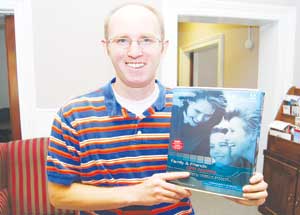Editorial
Front Page - Friday, July 10, 2009
American Heart Association teaching CPR through home-based kit
David Laprad

There’s a joke about heart attacks that goes like this: “For those of you who watch what you eat, here’s the final word on nutrition and health. It’s a relief to know the truth after so many conflicting studies:
Japanese people eat very little fat and suffer fewer heart attacks than Americans. Mexicans eat a lot of fat and suffer fewer heart attacks than Americans. Chinese people drink very little red wine and suffer fewer heart attacks than Americans. Italians drink a lot of red wine and suffer fewer heart attacks than Americans. Germans drink a lot of beer, eat a lot of sausage and suffer fewer heart attacks than Americans. Conclusion: eat and drink what you like. Speaking English is apparently what kills you.”
While the punch line is funny, heart disease is no laughing matter. The American Heart Association says heart attacks are the leading cause of death in the U.S., accounting for one in three deaths in 2006. With this in mind, the organization works to promote healthy lifestyles in every segment of the population, going into schools to discuss childhood obesity, raising awareness of heart disease among women and launching promotional campaigns to get people walking.
“Heart disease is preventable,” says Dale Huffstetler, director of the American Heart Association’s Chattanooga branch. “What makes it frustrating for us is that it’s so widespread.”
There’s good news, though. In 2008, the American Heart Association reported an annual death reduction of 25 percent since 2000. This number represents 160,000 lives saved nationwide each year.
One of the most prevalent tools for saving a heart attack victim is CPR, or cardiopulmonary resuscitation, a procedure than allows a person to use chest compressions and mouth-to-mouth breathing to manually circulate blood and oxygen to the recipient’s brain. This occurs after the victim’s heart has stopped beating.
“There was a lady in Chattanooga who had a baby, and in a rare case, the stress of the delivery caused a tear in her heart muscle. A few days later, she had a heart attack,” Huffstetler says. “Her husband was a policeman and had been trained in CPR, so he was able to save her life.”
Although the policeman was more than willing to help his wife, the American Heart Association says many people are reluctant to perform CPR. Some are afraid of being sued if they do it wrong, while others are unwilling to place their mouth on a stranger.
Fortunately, the options for helping heart attack victims have increased since surgeon Peter Safar invented CPR in 1960. User-friendly automated external defibrillators, or AEDs, which deliver an electronic pulse that can restart the human heart, are appearing in more and more public places, including malls, airports and schools. And new scientific research is suggesting compression-only CPR, in which the person administering aid foregoes mouth-to-mouth but still does chest compressions, can help a victim survive.
“Get down there and pump that chest. It’s better than standing there, twiddling your thumbs and waiting for the ambulance to arrive,” say Huffstetler.
Full CPR is preferable, however, and since AEDs are not yet located on every street corner and in every building across America, Huffstetler says it’s important for everyone to learn. Traditionally, CPR education has involved taking a class, but the American Heart Association has devised an easier way to learn how to save lives: its “Friends & Family CPR Anytime Kit.”
The product includes an instructional DVD, an inflatable CPR manikin and various accessories, such as antiseptic wipes. Using the “CPR Anytime Kit,” one can learn the core skills of CPR in 22 minutes. Also good: the product costs less than $30 when purchased through the American Heart Association.
“It enables people to learn CPR in the comfort of their own home and at their own pace,” Huffstetler says. “It’s how I learned CPR.”
For people who prefer to have a teacher present to offer feedback, the American Heart Association suggests contacting one of the local organizations that still offer classes, including Extend Life (698-4900), We R CPR (847-9039) and Memorial Hospital (495-7276).
Huffstetler also encourages people who obtained CPR certification in the past to relearn the skill, as the process has changed over the years. For example, the standard number of compressions between breaths has increased. “As we learn more about the cardiovascular system and how to more efficiently deliver blood and oxygen during an event, we tweak the standards.”
Even if the number of heart attack victims continues to drop, the American Heart Association will continue to promote the skill in an effort to save more lives.
“Heart disease is so prevalent,” says Huffstetler. “If you have that skill, not only can you help a family member, but also a fellow citizen.”
Visit the American Heart Association online at www.heart.org. Enter a local zip code in the search box to load the page for the Chattanooga branch.
|
|